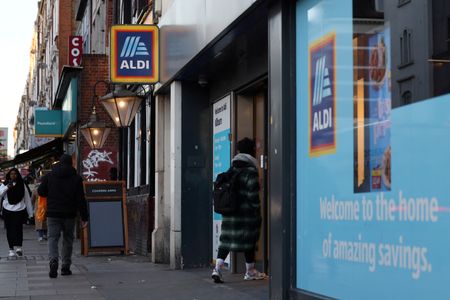By James Davey
LONDON (Reuters) – The British arm of German discounter Aldi said it would invest 1.6 billion pounds ($2.2 billion) over the next two years to accelerate store expansion, doubling down on its commitment to the UK market despite a 21% drop in annual profit.
Aldi UK, Britain’s fourth largest grocer, on Monday said operating profit dropped to 435.5 million pounds ($590.6 million) in 2024, which it said reflected price cuts, investment in infrastructure and higher staff pay.
It underperformed listed rivals last year, which didn’t suffer declining profits, mainly because it is more focused on investing in opening new stores, seeing long term opportunity in Britain.
Sales rose slightly to 18.1 billion pounds in the year ended December 2024 but its operating profit margin slipped to 2.4% versus 3.1% in the previous year.
The group, owned by Germany’s Aldi Sud, and rival discounter Lidl GB have expanded rapidly in Britain over the past two decades, transforming the country’s supermarket scene and forcing the traditional big players to up their game.
Aldi UK trails market leader Tesco, Sainsbury’s and Asda, but has the latter in its sights.
Currently trading from 1,060 stores, it plans to open 21 stores over the next 13 weeks and 80 over the following two years. It has a long-term target of 1,500.
Grocery industry data published last month showed Aldi UK’s sales rose 4.8% over the 12 weeks to August 10 year-on-year, giving it a grocery market share of 10.8%, just one percentage point behind Asda.
“We’re attracting more customers to more stores, more often,” Giles Hurley, CEO for Aldi UK and Ireland told reporters.
He said inflationary pressures were making it “really challenging” for families across the UK and they were responding by shopping around and prioritising value.
Consumers were increasingly treating themselves at home to premium own brand ranges rather than eating out, said Hurley – a trend he expects to continue in the run-up to Christmas.
As noted by other retailers, he was also uneasy about how consumer confidence and spending could be impacted by speculation of tax increases ahead of the UK government’s budget on November 26.
“We would encourage the government to adopt policies which don’t inadvertently add to the operating costs of businesses in the food sector,” he said.
($1 = 0.7374 pounds)
(Reporting by James Davey; editing by Sarah Young, Christina Fincher and Susan Fenton)











